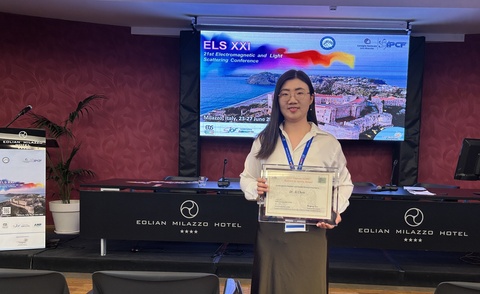
A University of Iowa engineering researcher has won a top award for early career scientists investigating how tiny particles interact with light and other electromagnetic particles in the atmosphere so scientists can improve weather forecasting and monitor air quality.
Xi Chen, an assistant research scientist, received the Richard M. Goody Award at ELS XXI: 21st Electromagnetic and Light Scattering Conference in Milazzo, Italy, in June. The award – presented by the Journal of Quantitative Spectroscopy and Radiative Transfer, a leading publication in the field of atmospheric radiation and remote sensing – recognizes recent PhDs who’ve made significant scholarly contributions to the field of atmospheric radiation and remote sensing.
“It is my great honor to receive this prestigious award, and I’m so excited to reach this milestone in my career,” Chen said. “I’m grateful to the awarding committee for this incredible recognition of my research achievement. I would also like to thank Dr. Jun Wang for nominating me and for continuing to challenge me with patience and his innovative ideas as my mentor. My collaborators also provide significant support to my research and always inspire me to move forward in my career path.”
Chen joined the Atmospheric and Environmental Research Lab (AER) at the Iowa Technology Institute (ITI), a research center within the College of Engineering, in 2019, soon after receiving a PhD. Chen holds a bachelor's degree in atmospheric science from Nanjing University in China and a PhD in atmospheric physics and atmospheric environment from the University of Chinese Academy of Sciences in Beijing.
Chen’s research is advancing understanding of Earth's climate and atmospheric processes. Many atmospheric particles, such as mineral dust, volcanic ash, and wildfire smoke, have spherical or irregular, non-spherical shapes. These shapes affect how sunlight and thermal energy are scattered and absorbed as they pass through the atmosphere, influencing global energy balance and weather patterns. By characterizing particles' interaction with light, scientists can model and map how far the particles travel and develop more accurate forecasting of extreme weather events.
Jun Wang, AER director and Lichtenberger Family Chair in Chemical and Biochemical Engineering, credited Chen for developing and sharing novel algorithms that calculate the scattering of non-spherical particles and map the height of dust and smoke aerosols from satellites in space. Chen has been published more than 20 times in her early career.
“She is very deserving of this award,” said Wang, who submitted the nomination. “Dr. Xi Chen is an easy-going, hard-working, genuine, dedicated, sincere and young scientist,” said Wang, professor and DEO of chemical and biochemical engineering. “She not only serves the community well by helping more than a dozen journals review papers, but also takes the motto ‘open source, open science’ to heart and puts it into action to make an impact on research community and our society.”
Richard M. Goody was a British-American atmospheric physicist and professor of planetary physics at Harvard University renowned for his legacy in the disciplines of atmospheric radiation, remote sensing, and climate science. Goody died in 2023.